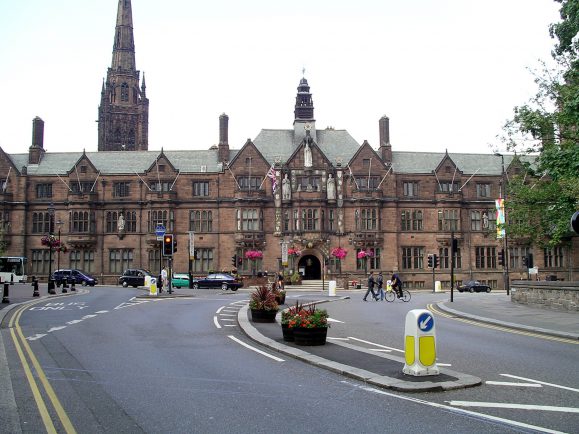COVENTRY voters go to the polls next week for council elections for which campaigning issues include housing on green belt, the future of city schools, and Coventry joining a West Midlands Combined Authority.
Labour’s massive majority at Coventry City Council – achieved since the party seized power in 2010 – makes any change in party control highly unlikely. But the Tories and other parties will hope to make gains and build their own momentum for future years.
Labour currently has 41 seats, and the Tories 13. A third of those 54 council seats are up for grabs next Thursday, when each of the city’s 18 ‘wards’, or areas, will return one councillor.
The Green Party and The Trade Unionist and Socialist Coalition (TUSC) are again standing candidates in all 18 wards. The Liberal Democrats and UKIP are standing in eight and seven wards respectively, while the Christian Movement for Great Britain has one candidate, in Foleshill.
Close battles are again expected in wards including Woodlands, Westwood, Cheylesmore and Bablake, where the green belt is featuring again as a priority on doorsteps.
TUSC candidates are also protesting against education policy which has resulted in a new government-backed ‘free school’, Finham Park II, and the proposed controversial closure of nearby Woodlands Academy, to be merged with Tile Hill Wood School.
Labour politicians blame the Tories in government, while others point to Labour council leaders’ support for establishing the free school in a consultation with the government.
As this newspaper highlighted, the council’s education cabinet member, Labour councillor David Kershaw, also recently set up an academy trust business with the aim of taking over free schools and academies elsewhere.
The Labour council wants to build on up to 10 per cent of green belt to enable the city’s population to rise by over a quarter to above 400,000 – supposedly to make Coventry a ‘top ten city’.
Labour candidates are campaigning on a claim of economic rejuvenation for Coventry under their party’s leadership, not withstanding their criticism of the stewardship of the economy nationally by the Conservative government.
The Labour council under leader Ann Lucas – who while not facing a public vote will face a challenge from Labour colleagues to remove her as leader the day after the election – claims it is laying the foundations for city centre transformation and inward business investment, including by Jaguar Land Rover.
Opponents point to failures to make promised progress with city centre redevelopment and at the Friargate business development next to Coventry station, although Labour claims improvements to that area and Broadgate are helping to attract businesses.
TUSC, led by ex-city MP and former city councillor Dave Nellist who is standing in St Michael’s, has led the charge that Labour councillors have too passively implemented unprecedented Conservative government funding cuts, and should be doing more to challenge ‘austerity’.
The cuts have removed services including some elderly care services, libraries, family centres, and the 1000-year-old remains of the Lady Godiva-founded ‘city’s birthplace’ at the Priory Visitor Centre – the focus of an ongoing Coventry Observer campaign for it to be re-opened urgently.
The council’s Tories have campaigned against some of the cuts, claiming money to keep them open could have been found in Labour councillor Damian Gannon’s Budget – by cutting the town hall trade union budget and other measures.
Ruling Labour councillors claim they have had no choice but to implement ‘unprecedented’ Tory government cuts – a ‘mantra’ much ridiculed on the opposition Tory benches during Coun Gannon’s annual Budget speeches.
Homes on the Greenbelt proposed in Coventry’s Local Plan for development are also featuring in campaign exchanges in Sherbourne, where some party members are furious that former councillor Lynnette Kelly was parachuted in by regional officials to represent them above their heads.
There are claims that Mrs Kelly’s election campaign leaflet is misleading in inaccurately claiming that the Labour council is ‘Protecting Coundon Wedge’ – much treasured green space.
Concerned residents say the ‘Coundon Wedge’ has always included parcels of land now earmarked by the council for housing development. They include the ‘northern end of Browns Lane, a short section of Hawkes Mill Lane and Wall Hill Road, Coundon Wedge Drive as far as the island at the entrance to Lyons Park and the north eastern boundary of Lyons Park.’
Standing in Bablake for Labour is solicitor and Coventry university lecturer Alan East, against Conservative Glenn Williams and Dan Crowter of TUSC. Longstanding Greenbelt campaigner, resident Tony Middleton, is standing for the first time, for UKIP, while fellow high-profile campaigner Walter Milner stands for the Greens.
Labour councillors point to Tory council plans before 2010 to build on Greenbelt. But Tories argue the previous Labour government was responsible for that, and that the council’s Labour leaders have u-turned from previous ‘cast-iron pledges’ to Coventry voters that all green belt and all green fields would be protected from development.
The Conservative group lead by council opposition leader John Blundell points to government growth money coming to Coventry. They argue that some cuts to town hall bureaucracy were needed, the national deficit has to be tackled, and that chancellor George Osborne’s reforms to local government finance will make councils more accountable for their performance.Changes include that by 2020 councils will be much less reliant on government grants and more reliant on more income from council tax and business rates, which councils will be able to retain.
The Tories are also campaigning against Labour council leaders’ inclusion of Coventry City Council in the controversial West Midlands Combined Authority, and how the whole saga has been handled ‘undemocratically’. It has been viewed by thousands of Coventry people signing petitions and protesting as a ‘Greater Birmingham’ super-council’, which protestors claim will inevitably see some powers transferring away from Coventry.
Labour leaders claim the ‘devolution deal’ on offer from Mr Osborne will see spending pots over economic development, jobs and transport transfer from London to West Midlands council leaders on the combined authority and the elected mayor heading it.
All other parties with candidates in Coventry council elections will hope many traditional Labour voters stay at home this year, following last year’s general election defeat and subsequent party splits and Westminster hostility to Jeremy Corbyn’s leadership, despite his landslide leadership victory among ordinary party members.
Turnout for recent stand-alone council elections in Coventry – in years when there is not a general election – has seen around 30 percent of people eligible to vote turning up at polling stations. In these years, Labour’s share of the vote in Coventry since 2012 has been falling. Labour failed to make gains two years ago, and it lost two seats last year.
GREENS AND LIB DEMS OPPOSE WMCA AND ELECTED MAYOR
BOTH the Green Party and Lib Dems in Coventry are also standing on a platform of opposition to the city joining the West Midlands Combined Authority headed by an elected mayor.
The Greens claim it will ‘make services less democratically accountable’; and point to Coventry voters saying ‘No’ in a 2012 referendum to having an elected mayor system to run the council.
The Lib Dems said Coventry’s voice would be ‘drowned out’ – and advocate joining a combined authority with Warwickshire and possibly Solihull instead.
They are calling for a “more open and responsive council”, including introducing a public question time at council meetings. The Lib Dems add: “Coventry council does not do enough to consult and involve the people of Coventry in its decisions.”
Coventry Green Party claims the Labour council’s plans for green belt housing development are about attracting wealthy families. They say the Local Plan consultation showed 86 per cent of people opposed it, while there was enough brownfield for 18,000 homes and 1,3000 empty properties – which should be used to meet the housing needs of the increasing elderly population and people living alone.
Like TUSC, the Greens are opposing ‘austerity’ cuts’ and are calling for a programme of council housing to tackle a housing crisis and soaring private rents.
The Greens are opposed to forced conversions of council-maintained schools to academies, preferring the councils overseeing role in ensure local accountability, support services for schools, and effective schools provision which meets families’ needs.
Other Green Party policies include capping council chief executive pay and a minimum wage of £8.25 for council staff and contractors; improved local public transport, roads and cycleways.
The Lib Dems want to phase out the Whitley incinerator and move towards more recycling; replace the council tax with a tax based on ability to pay; protect green land by introducing government targets for brownfield use which Coventry would have to follow; more social housing; a review of ‘shared space’ junctions in the city centre on safety grounds; and increasing park and rides to tackle road congestion in Coventry.
UKIP candidates argue pressures on Coventry’s Greenbelt and services from increased population and immigration can be tackled by voting ‘Leave” in the EU referendum in June.
UKIP has been increasing its share of the vote in Coventry in recent years, while threatening to return at least one councillor.
It insists it is not a single issue party and it has raised concerns about a lack of democracy with the West Midlands Combined Authority, and over schools policy.
Its high-profile former Coventry leading figure Mark Taylor has defected and is standing in Cheylesmore this year for the Conservatives.
Last year, UKIP, pointed to 16 third places in Coventry, claiming to be the third biggest party in the city.









